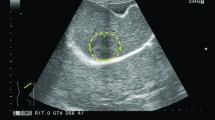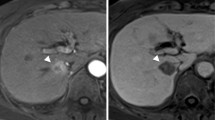Abstract:
A 62-year-old Japanese man with hepatitis B virus-related liver cirrhosis revealed α-fetoprotein (AFP) elevation. Dynamic computed tomography, taken at this time, showed a liver tumor in the anterior segment. As the patient refused any further medical treatment, he was observed in an outpatient clinic. The size of the tumor reduced and the serum level of AFP decreased gradually without any treatment. Twelve months after the initial diagnosis, the tumor could not be detected by computed tomography (CT) scan, and the level of AFP had declined to the normal range. Blood supply is essential for tumor growth and an arterioportal shunt near the tumor may change the dynamics of blood flow to the tumor. The shunt found in this patient was thought to be one of the causative factors leading to regression, but it could not be denied that immunological mechanisms may have played an important role in the spontaneous regression of hepatocellular carcinoma.
Similar content being viewed by others
Author information
Authors and Affiliations
Additional information
Received: July 28, 1998/Accepted: November 27, 1998
Rights and permissions
About this article
Cite this article
Misawa, K., Hata, Y., Manabe, K. et al. Spontaneous regression of hepatocellular carcinoma. J Gastroenterol 34, 410–414 (1999). https://doi.org/10.1007/s005350050285
Issue Date:
DOI: https://doi.org/10.1007/s005350050285




